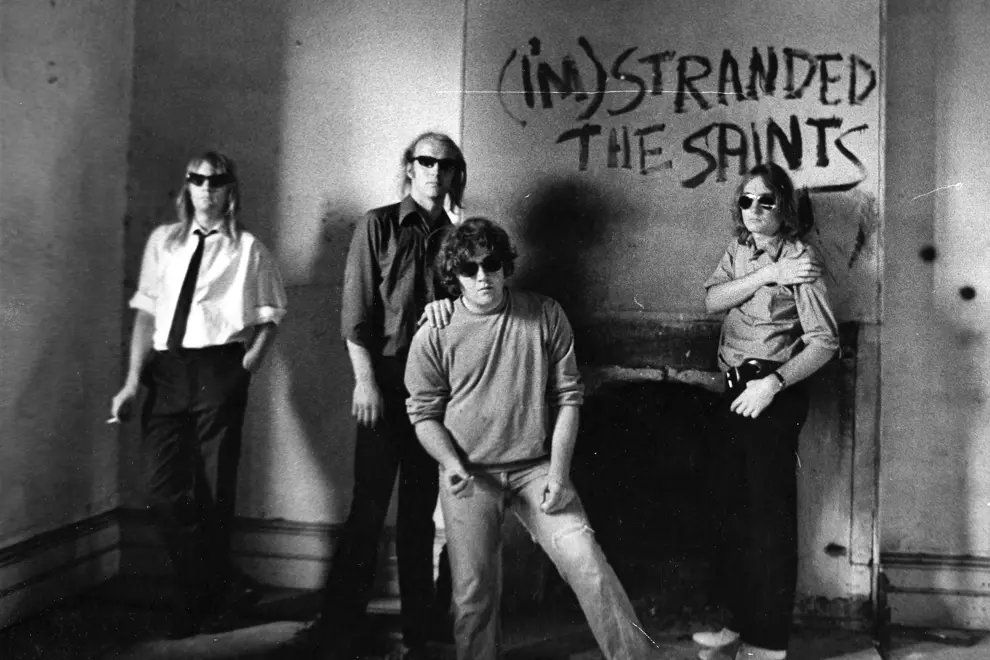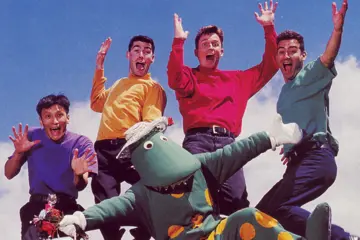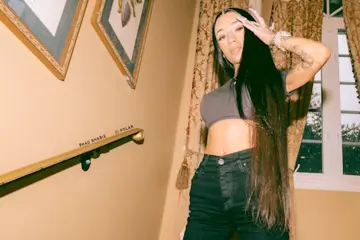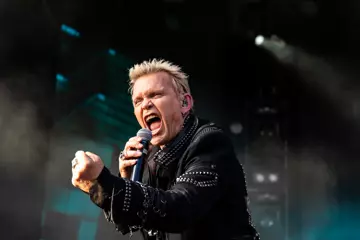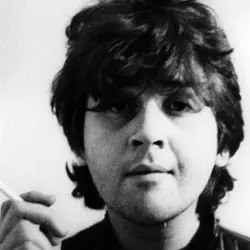 The Saints
The SaintsIn early 1977, young Brisbane rock band The Saints released their debut album (I’m) Stranded, a roughshod but exhilarating slab of rock’n’roll completely at odds with what was happening around them at the time, but which would soon help set the template for so much music to follow.
The road to the release of (I’m) Stranded is an extraordinary tale of a band virtually ignored in their hometown, yet who - thanks to a potent mixture of self-belief, entrepreneurial DIY spirit, serendipity and incendiary music - were eventually feted on foreign shores, then dragged overseas to stake their claim in a historically-important scene they had neither awareness of nor interest in.
The pre-internet world seemed a much larger place than today, and the early incarnation of The Saints, which recorded the lauded debut - the original trio of guitarist/chief songwriter Ed Kuepper, vocalist Chris Bailey and drummer Ivor Hay, joined later by bassist Kym Bradshaw - had developed their own unique sound in isolation, blissfully unaware that overseas similar sonic terrain was being traversed by nascent punk bands such as the Ramones in New York City and the Sex Pistols in London.
But as the young music-obsessed friends were honing their aesthetic in the south-western suburbs of Brisbane, they weren’t thinking of global domination; they were more about occupying themselves in a town not renowned at the time for its entertainment options.
Don't miss a beat with our FREE daily newsletter
Hay remembers meeting Kuepper and Bailey - already friends through high school - in 1971 at Oxley Station via a mutual friend and how the seeds for their musical connection were sown almost immediately.
“The first time I met Chris and Ed, I was going to the cinema to meet my old school buddy there - this was in ’71, so I was at the start of grade 10 - and then behind me, I heard Jeff Wegener’s voice,” he tells. “They’d just come back from Ed’s place and were at Oxley Station because they were going to go to this party at Toowong, and when they invited me along, I thought, ‘That seems like more fun than going to the pictures’.
“So the four of us got on the train and went to Indooroopilly, and we went to the bottle shop there - Jeffrey had a little bit of a beard, so we got him to go and buy a bottle of Brandivino, I think it was - and we ended up just sitting around talking most of the night and just having fun. It just seemed to be good fun, we were singing Kinks songs or something like that, or some sort of socialist revolutionary song.
“I think, collectively, we had some social understanding - we kind of knew where we were coming from. Ed was an immigrant and probably fairly dislocated; Bailey was too. I was from a large-ish family. I had a mother, but my father had died a long time ago. We were all kind of looking for things, and I think the idea of coming together and making music just seemed like a natural way of being together.
“We kind of understood each other and appreciated each other’s humour and style and all the other things, and music just seemed to be a really natural progression - it just seemed to happen organically.
“With Chris, I remember teaching him guitar, and I remember Ed teaching me some guitar stuff and things like that. We were really like comrades, and it was really great working together. The styles of music we were interested in seemed to gel together as well. We were playing things like The Small Faces’ Tin Soldier because it had keyboards and Bob Dylan’s Ballad Of A Thin Man, which was really great stuff.”
The early trio version of The Saints, with Hay providing rhythm on piano—in the early stages, calling themselves Kid Galahad & The Eternals—played their first impromptu gig at a party in 1973, a routine that Hay remembers quickly becoming par for the course amongst their social circles.
“We ended up doing that quite a few times - it became almost an act we’d do at parties,” he smiles. “I remember if there was a piano around somewhere, we’d sort of jump on that, and I’d play piano, and Ed and Chris would do their stuff.
“We did rehearsals every weekend; it just seemed to be ‘do whatever you did during the week and then rehearsals’. We’d go to a hall and rehearse, or we’d rehearse in people’s garages, out the back of my place, Ed’s bedroom, Chris’s bedroom, my bedroom.
“So wherever we could, we’d just be playing together and rehearsing. And in those earlier days, when I was playing piano, it was just the three of us going through songs from records or the radio, and then also starting to pick up originals like Nights In Venice and One Way Street - they were really early ones - and I think (I’m) Stranded maybe came in around that time.
“But it had that progression, and it was around that time where we thought, ‘Okay, we really need to have a proper rhythm section rather than a keyboard’, so I jumped onto bass and for a while we had a succession of drummers. But eventually, I moved over to drums, and we started getting bass players in, and progressively put together a proper band.”
A proper band they may now have been, but unfortunately in ‘70s Brisbane, that didn’t really count for much. Their revved-up covers had been largely supplanted by revved-up originals, and very few bands at the time played their own songs, let alone ones so fast and so loud, meaning that they were largely shunned by the existing industry and had to put on their own guerrilla gigs.
“There were no real entertainment venues in Brisbane,” Hay continues. “There might have been some things, but if you went to a place that had a band, they were most likely playing Smoke On The Water and stuff like that. The Australian Music Company in Spring Hill used to have events but most of the bands were playing just horrible stuff, it was just rubbish.
“So unless someone was hanging around our kind of clique, no-one knew much about us, and we didn’t really care too much about anyone else. We were very isolated in that sense. But I think that proved to be very beneficial to us.
“I think Ed had a really good idea of the sound he wanted and I think he started developing that at a very early stage. I think that solid fuzz guitar made a real ‘wall of sound’ - I don’t want to use that term in the wrong way - but he was really developing innovation in terms of how guitars could drive movement and interest and be really solid.
“And I think Chris was developing his own unique style too; that snarling kinda thing, which was really just a bit of his personality. But it was really interesting how both of them kind of developed this organic capability.
“And this was in ’72 and ’73, so when things started to happen a few years later and the Ramones record came out, fortunately (I’m) Stranded had already been recorded and sent out before we heard any of that stuff, so we’d already documented that our sound had already been established.”
With no prospect of outside assistance, in 1976, The Saints had kickstarted the Australian independent scene by pressing and distributing (as Fatal Records) their own 7” single (I’m) Stranded - soon to be the title track of their debut LP - which they’d sent out to radio stations and media all over the Australia and the UK, only to be shocked by the response which started filtering back from the Northern Hemisphere.
A small UK indie, Power Exchange, released the single, and they managed to pre-empt most of the London punks in terms of getting a record out, with the press there getting behind them unequivocally - Sounds Magazine famously declaring it, "Single of this and every week” - in turn forcing the UK branch of EMI to contact the Sydney branch of EMI to demand that The Saints be signed to a three-record deal.
“We could have said ‘I told you so,’ but I don’t know who we would have said it to because nobody here was particularly interested,” Hay laughs. “Record companies didn’t want to know. We went to EMI and gave them the Stranded single, and they went ‘Nah’, and we got knocked back by a couple of others. Brisbane didn’t really have much in those days because it was just a backwater satellite town in the ‘70s, and there wasn’t much of a music establishment.
“I think there was somebody who we approached to do some gigs, and he thought we weren’t up for it and threatened us that we would never play in Brisbane again. We had no engagement with any sort of industry, so to speak, and then we left Brisbane, so we never had any involvement with it.
“So there wasn’t really vindication in any way because nobody back then was stopping us; they weren’t even aware of us to stop us.”
Now suddenly on a major label, that December, the four mates spent two days in a small Brisbane studio with EMI house producer Rod Coe to ostensibly record demos for their debut, but in typical Saints fashion, the results eventually became (I’m) Stranded itself.
“Those sessions were 100% meant to be demos,” Kuepper recalls. “EMI here was really not keen on signing the band; it was all instigated from EMI's London office. But EMI had their way of working, and what you did was basically demo some songs, and that's what we did. But when we finished, we just said to Rod Coe, ‘That's the album'. And he said, ‘Okay’.
“He took the tapes and mixed them, but it wasn’t quite the sound we were chasing at the time, so Chris and I then remixed the whole album, which Rod didn't get involved in. I think he popped his head into the studio once and had an amused look on his face and went out, having observed us basically going, ‘How can we make the guitars louder?’”
With things now happening at an incredibly rapid pace, The Saints first briefly moved to Sydney - playing a couple of shows there with contemporaries Radio Birdman which have gone down in Oz rock folklore - as well as making their first forays to Melbourne.
(I’m) Stranded the album came out in February 1977, and by the following May, the young band were in London - playing their first UK gig at the Roundhouse with the Ramones and Talking Heads - quickly adopting the city, now the epicentre of the burgeoning punk scene, as their new home base.
“From the time we decided to record the single and pay for it ourselves to the time we landed in London and played at the Roundhouse is probably eight months or something like that, it was pretty crazy,” Hay marvels. “Something was happening every couple of weeks to move things forward, once we pressed up that first single and sent it out to everybody, and then hearing on the ABC that The Saints have been nominated as Single Of The Year by Sounds Magazine in London, we honestly thought, ‘Something’s wrong here!’
“Next thing, EMI’s getting in touch and letters and telegrams are being sent to Ed’s parents’ house - because that was the only contact information anyone had - and then EMI showing up and the manager Chris Gilbey saying, ‘I want to sign you boys and make you rich!’ Next thing you know, we’re getting in the van with all of the gear and driving down to Sydney in April of ’76, and then that June, we were playing the Roundhouse.
“We were weird country boys and had never seen anything like it. And then we had people recognising you and wanting to talk to you and stuff like that; it was certainly a culture shock. There were a lot of things that were annoying about it as well, in terms that there was a strong sense of wanting things to conform with this strange punk ideal which was infuriating, I couldn’t understand what any of that was about.
“We were never going to conform or do anything we didn’t want to do, and I think it just boils down to how we all started playing music together because it was enjoyable. Fortunately, Ed and Chris were really good at producing some fantastic songs, and we weren’t really about to start pandering to any outside concerns.”
Kuepper also remembers the transition from the back blocks of Brisbane to the bright lights of London being a rather disorienting experience.
“It was a real mix of things,” he ponders. “It was really exciting. It was kind of a head spin just to sort of come to terms with how much different it was - it was just such a diverse society. You’d just walk down some side street, and there would be interesting shops and that sort of stuff, you know, tons and tons of record shops and book shops, which made me think, ‘Oh, I could move here immediately’.
“The funny thing about it was that it was also a bit disappointing because it was a lot more parochial than I would have thought. I guess I expected a race of super-beings or something, you know, imaginary people that had great insight. They weren't that different to the yokels back in Brisbane. That took me a while to come to terms with, actually.
“Then when it became a point that you almost had to be punk, which came about sort of around 1977, it kind of started to become so orthodox and silly. I think from my point of view, why I wanted to distance the band from that was because we'd been going before punk. We were our own thing. We didn't come out of punk.
“Punk didn't hit Australia until a year or so after The Saints had broken up. Punk didn’t hit the States in a big way until the mid-80s almost, after hardcore and that sort of thing. So it means something different to people these days.
“I think The Saints were punk in the same way that The Pretty Things were punk or, you know, Eddie Cochran was a punk, that sort of thing. I think there's a strong thread with a lot of that sort of music.”
Sadly the original version of The Saints never returned to Australia, having released two more classic albums in 1978 - Eternally Yours and Prehistoric Sounds - to complete their EMI contract, and then imploding internally in London.
Kuepper and Hay returned home to pick up the pieces and start new musical journeys, while Bailey stayed in Europe and eventually kept making music under The Saints banner, releasing another 11 albums of more refined rock’n’roll fare (as well as a handful of solo releases) before his tragic passing in 2023.
“I guess you’ve got to take the good with the band in that sense,” Hay reflects on the split. “I always had faith in the band that it would sort of keep going forward, and then when Chris decided to pull the plug during Prehistoric Sounds - he kept going, and we finished because I think Ed had asked him to finish the album - but after it came out and nothing happened, we all went our own ways.
“I think the first two albums are really just the songs which had been written over that long period of time at the beginning and finally put on vinyl, and it wasn’t until the third album that we really started developing new material and new capabilities altogether.
“I was a bit disappointed because it was starting to showcase a very interesting collaboration, and Ed’s style of music and writing was really coming into a different world altogether. Maybe Chris felt a bit threatened by that, I don’t know.
“But he just decided that he was going to be controlling everything on his terms and in his way and that it was his band, and that’s good. So that was that.”
Now nearly five decades later, that original thrilling era of The Saints is back in the spotlight, firstly with a deluxe 4-LP boxset reissue of (I’m) Stranded and then with a full Australian tour by The Saints ’73 - ’78, a band put together for the occasion which finds Kuepper and Hay now joined by Mick Harvey (The Birthday Party, The Bad Seeds) on guitar, Peter Oxley (Sunnyboys) on bass and Seattle rock legend Mark Arm (Mudhoney) filling Bailey’s inimitable shoes.
“The boxset has been a real labour of love,” Kuepper explains. “It's four LPs: it's the first album remastered for vinyl for the first time in decades, and it sounds really good. The second album has one extra track on the album, which isn't on the first officially released thing, and it’s those alternate mixes that were done by Rod Coe from EMI.
“We rejected those mixes at the time for maybe being a bit too conventional, but looking at it however many decades later, they're quite interesting. They sound really good, but they do sound different - well, I think they sound quite different - to what Bailey and myself went to Sydney to remix, which is what the proper album is.
“Then, there's a third album which has for the first time on vinyl the Live at Paddington Town Hall performance - or at least the 17-and-a-half minutes that exist because the show would have been longer, but that's what was recorded, that we're aware of - and the other side of that is non-LP singles and EP tracks.
“The fourth LP is the Live at the Hope & Anchor recording, also on vinyl for the first time officially, and it sounds really good, better than the bootleg that's been circulating.
“It was good going putting it all together; we were fortunate that a few photo albums turned up, so we got access to a bunch of photographs that haven't been seen before of the band, which I think capture the mood and the atmosphere really nicely. There's some live shots and just some socialising shots and that sort of stuff.
“Plus a whole shit load of receipts and telegrams and all that kind of thing. So yeah, it was sort of nostalgic and sort of slightly mind-blowing to realise how quickly time passes because I still sort of identify with the people in those photos, which is weird.”
Given that the original incarnation of The Saints never completed an actual Australian tour, Kuepper is happy at this belated chance to take these songs on the road.
“When we started work on the boxset, I just thought it would be a really good thing to tour in support of it, to coincide with it, so that's how it came about,” he tells. “I just asked some people if they were interested in the concept, and those people, to my great pleasure, said yes.
“It’s especially great to have Ivor playing. The performances on those recordings I think are as important as the songs themselves. There's sort of a uniqueness to the way that Ivor plays, and from the very first run-through we had, it was just kind of like the years melted away. Like, ‘We’re back!’
“Having Mick [Harvey] is really important as well. On the original Saints records, I usually double-tracked the rhythm guitar - on the first album, it was all double-tracking electric, then on the second one, I started to use acoustic, sort of mixed in with that - and I just wanted to be able to present that live and I can't do the two at the same time. And Mick is just a really great rhythm guitar player.”
Hay - having been ensconced in the business world now for many years - is also excited about his imminent return to his rightful spot on The Saints’ drum-riser.
"It’s hard to recognise separately that contribution which The Saints made to Australian music - and arguably globally - from these fairly simple and organic ways of working together,” he offers. “I think this tour supporting the boxset is really interesting, and when Ed asked me last year if I wanted to do it, I said, ‘Yeah!' I just wanted to make sure that I’m up for it in terms of fitness and capability.
“When I was younger, it used to kill me, but we used to only play for 40 minutes or 45 minutes most of the time, now we’re playing hour-and-a-half sets every night for a month! What I’m mostly doing now is a combination of keeping fit, going to the gym, practicing every day - in other words practicing technique and fitness to make sure that I can keep up.
“The speed of some of those songs and the energy needed is amazing - you can’t do them slowly and you can’t feign the energy or intensity, it really keeps the heart rate up.
“I’ve always sort of played following Ed’s rhythm and timing, and he would often play ahead of the time. He was always ahead of the beat, and I was always trying to catch up with him, which I think was a little bit of a dynamic that Ed was trying to set up so that the music was always pushing forward.
“So there was a little bit of that, but also the styling and the phrasing is quite distinct - I’ve got a shuffle-y style, which is a little bit R&B, a little bit jazz, and a little bit early rock’n’roll. So it’s not what [people] would think of as ‘punk’ in that sense, but it’s got its own style.”
Which only leaves the guest frontman Mark Arm from Seattle rock legends Mudhoney - a long-term Saints devotee - who’s understandably nervous about stepping into the massive hole left by the late Bailey.
"I love the band; they've been a part of my life for a very long time,” he admits. “Those first two records, (I’m) Stranded and Eternally Yours, were released in the States on Sire. And I think they might have been a little bit over-produced numbers-wise. Because they were like [The Stooges’] Raw Power, easy to find and nice price records.
“They were so influential on how I perform, like anytime in Mudhoney I would do like a 'Come on!’ or even a ‘Yeah!’, that's a nod to The Saints. Not that people would realise; it’s probably obvious only to us.
“But yeah, those first two Saints records were readily available, and they were pretty ubiquitous. If you'd go to a party in Seattle, inevitably, one of them would get thrown on.
“But what really blows me away is that where they came from at the time, there was nothing like them - I mean, they were kind of maybe Stooges adjacent or whatever, they had a few touchstones - but they basically kind of came up with a thing on their own, in a vacuum.
“Like, they didn't know about what was happening in Sydney. They didn't know about what was happening overseas, I mean really, they hadn't heard what was happening in New York or then later in the UK.
“And obviously, they fully believed in what they were doing to the point where they were, like, ‘We're going to record our own 7-inch and send it around’. And it sounded like their early Brisbane shows were just like house shows that they’d put on themselves - that’s DIY before DIY was like a known thing.”
In recent times, Arm has been practising for the impending shows in his own DIY fashion, atoning for the tyranny of distance by driving around his native Seattle with The Saints’ early albums blaring from the car stereo, singing along with gusto.
“I'm actively trying to memorise the songs,” he smiles. “I don’t want to be reading words onstage or anything like that, so I'm just going through them one song at a time. For a while, I was just kind of listening to all three records, and then I was given a list of songs that we're focusing on, which I'm not going to divulge.
“So I'm going through each song at a time and just trying to memorise that, and then I'll move on to the next one. And then when I feel like I've got that one, then I'll go back and - this is in my commute - I just crank it up in the car and sing along at full volume to the songs and keep adding one more to the list.
“There’s also a bit of deciphering happening - there's always singing along, but, like, how accurately? Just trying to figure out some of what Chris was actually saying at some points is a little tough, he kind of slurs things together and he's got that really cool, snotty attitude that comes across, but it kind of obscures some of the words a little bit. And his phrasing is amazing and way trickier than you think it would be.”
Arm has stood in for departed singers in reunions before - most notably when helping substitute for the MC5’s late frontman Rob Tyner during that band’s 2003 global reunion as MC3/DTK - so to a degree, he knows what he’s in for.
“Hopefully, we don't fuck it up,” he chuckles. “I mean, it's daunting, you know, I totally feel that. When I did the MC5 thing, I told Wayne Kramer, ‘For one thing, I'm not as good a singer as Rob Tyner, you know?’ and he just said, ‘Well, just be yourself and bring yourself to it, you’re not trying to fill Rob's shoes.’
“So I was just trying to be respectful and to do it honestly and accurately to the best of my ability. And that's the same approach I'm taking to this. As far as I'm concerned, I'm just lucky to play a part in this, and it's Ed and Ivor's show, and I'm just stoked to be there.”
These days, The Saints are, somewhat ironically given their initial treatment, widely regarded as the forefathers of Brisbane’s vibrant music scene and one of the best and most important bands to ever emerge from the city. A fact for which Kuepper, in his own quiet way, seems grateful.
“I'm not sure what the right word for it is, but I feel good about it,” he says with a wry grin. “Proud makes it seem like I sort of walk around with my chest puffed up. Maybe I should have; it's good for your posture.
“But no, I feel pretty good. I mean at the time it felt fantastic to have recorded a record and have it kind of dismissed by local competition only to have sort of cultural arbiters from overseas say, ‘Actually this is very good'. I mean it was just hilarious, it was great.
“But I think if people had been able to foresee the future and told us back then how it would all pan out, I don't think we would have taken it all that seriously. But you know, I'm chuffed that the music has lasted this long. It's kind of, you know… it's not bad.”
The Saints ‘73 - ‘78 will go on tour this November. The deluxe edition of (I’m) Stranded will be released next Friday - you can order that here.
THE SAINTS ‘73-‘78 AUSTRALIAN TOUR 2024
WITH SPECIAL GUESTS
Wed 13th Nov: Adelaide Hindley St. Music Hall
special guests: The Double Agents
Friday 15th Nov: Castlemaine Theatre Royal (SOLD OUT)
special guests: Parsnip
Saturday 16th Nov: Melbourne Northcote Theatre (SOLD OUT)
special guests: The Double Agents
Sunday 17th Nov: Melbourne Northcote Theatre
special guests: Alien Nosejob
Wednesday 20th Nov: Fremantle Freo Social
special guests: Chimers
Friday 22nd Nov: Sydney, Enmore Theatre (SOLD OUT)
special guests: Kim Salmon & The Surrealists
Saturday 23rd Nov: Brisbane, Princess Theatre (SOLD OUT)
special guests: Chimers
Sunday 24th Nov: Brisbane, Princess Theatre (SOLD OUT)
special guests: Chimers
Monday 25th Nov: Brisbane, Princess Theatre NEW SHOW
special guests: Chimers
Wednesday 27th Nov: Hobart, Odeon Theatre NEW SHOW
special guests: Liquid Nails
Friday 29th Nov: Thirroul, Anitas Theatre NEW SHOW
Saturday 30th Nov: Byron Bay, The Green Room NEW SHOW
Find tickets and more information at Feel Presents.

